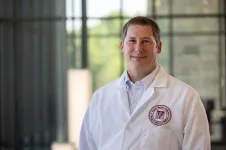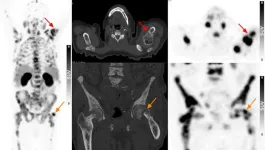(Press-News.org) In 2020, 771 million people worldwide still lacked access to clean drinking water, according to UNICEF and the World Health Organization.
For this reason, many nongovernmental organizations (NGOs) prioritize building new water projects, including handpumps and small piped systems, to bring clean water to rural areas of developing countries.
Alfonso Pedraza-Martinez
New research from Alfonso Pedraza-Martinez, the Greg and Patty Fox Collegiate Professor of IT, Analytics and Operations in the University of Notre Dame’s Mendoza College of Business, examines the critical problem of drinking water access in rural areas of developing countries and recommends optimal locations to build new water projects.
“Improving Drinking Water Access and Equity in Rural Sub-Saharan Africa,” forthcoming in the journal Production and Operations Management, studies access to drinking water in Tigray, Ethiopia, where millions of people walk hours each day to access communal water. The study, co-authored by Chengcheng Zhai, Kurt Bretthauer and Jorge Mejia from Indiana University, pulls from field research conducted in Tigray and collaborations with local and international NGOs.
“The burden of getting water falls mostly on women and children,” said Pedraza-Martinez, who specializes in humanitarian operations and disaster management. “It is not rare to see a woman accompanied by her children carrying a heavy jerrycan full of water back home in the scorching hot weather.”
Due to a lack of local government solutions, NGOs build water projects that extract underground water to reduce the population’s distance and time to access it. In collaboration with U.S. NGO Charity: Water and Ethiopian NGO Relief Society of Tigray, the team worked to understand the roles of the different stakeholders.
“Building water projects is expensive and funding is scarce,” Pedraza-Martinez said. “NGOs must select locations for new water projects while navigating tight budget constraints and very limited access to data on demand locations.
“We discovered that communities actively participate in the management of existing water projects, so we propose that two neighbor communities collaborate, pooling their demand, to increase the potential supply for both communities.”
The team created a unique dataset with current demand and distance to an existing water project in Tigray. Using analytics, they built an optimization or ideal solution (centralized model) that incorporates community collaboration, and compared its solutions with the current practice that serves each community separately.
The community collaboration model proved to be a better solution — in terms of distance to water and equity in the access to water — than the other models they considered. The “minimax” model adjusted the objective to minimizing the maximum distance to water and the equitable allocation model adjusted the current per capita budget allocations to assign more budget to beneficiaries who are further from water.
“When Ethiopian communities (kebeles) collaborate to access water as a single, larger community, it removes geopolitical boundaries for water purposes,” Pedraza-Martinez said. “It gives people who live on the outskirts of one kebele the option of walking a shorter distance toward another to use a hand pump or other water source, rather than walking a longer distance to find one in their own kebele. If there is cooperation, this solution is very effective to reduce distance and increase equity.”
Motivated by Ethiopia’s current civil war, the team also created a model to study ways to improve drinking water access amid supply shocks.
The team is sharing its findings with Charity: Water, which is using the new model to inform the selection of locations for new water projects in Malawi and the Central African Republic, along with other countries. They also plan to publish a pedagogical case study to share their research findings with MBA programs around the world.
Contact: Alfonso Pedraza-Martinez, 574-631-8734, apedraz2@nd.edu
END
New research offers solutions to improve drinking water access in developing countries
2023-08-14
ELSE PRESS RELEASES FROM THIS DATE:
UC study focus: faster, more accurate way to diagnose lung infections
2023-08-14
A federally funded study, led by University of Cincinnati researcher Nalinikanth Kotagiri, looks to develop a new imaging method that can identify certain types of lung infections — in real time — in order to speed up treatment for critically ill patients.
Kotagiri, an associate professor of pharmaceutical sciences at the UC James L. Winkle College of Pharmacy, has been awarded a five-year $3 million, R01 grant from the National Heart, Lung, and Blood Institute (NHLBI) to develop and study the effectiveness of different kinds of injectable probes (metallic contrast agents) that would collect at the site of the infection and immediately light up under a nuclear ...
Illinois professor describes how whaling shaped U.S. culture even after petroleum replaced it
2023-08-14
CHAMPAIGN, Ill. — The whaling industry helped drive industrialization in the 19th century, with whale oil used to light lamps and lubricate machinery. Even after petroleum replaced whale oil as an energy source in the U.S., whaling continued to be part of our cultural imagination and helped develop the idea of an energy industry, said University of Illinois Urbana-Champaign English professor Jamie L. Jones.
Her new book, “Rendered Obsolete: The Afterlife of U.S. Whaling in the Petroleum Age,” examines the influence of a dying industry during the massive energy transition from the organic fuel sources of the 19th century, including whale oil and wood, to the extraction of fossil ...
In battle against pancreatic cancer, grant-funded H-FIRE study offers hope
2023-08-14
Only about 10 percent of patients survive as long as five years after a diagnosis of pancreatic cancer.
“Pancreatic cancer is very hard to treat,” said Irving Coy Allen, professor of inflammatory diseases in the Department of Biomedical Sciences and Pathology at the Virginia-Maryland College of Veterinary Medicine. “It's one of the top five deadliest cancers in the U.S. And it's deadly because by the time you find out that you have a tumor, it's usually metastasized. You can usually treat the local tumor, but how do you treat the metastatic lesions?”
The National Institutes of Health has awarded $2.6 million to a Virginia Tech team ...
Consumers who buy cannabis products containing HHCs could be getting less than they hoped for
2023-08-14
Key takeaways
In the fast-growing marketplace for recreational marijuana and related products, products containing cannabinoids called HHCs are gaining popularity.
The neurological and physiological effects of HHCs are not well understood.
A new study by UCLA chemists is the first to explain how well HHCs bind to receptors in the human body; the scientists also devised a safer way to produce HHCs than the current standard process.
As more of the nation has adopted legal marijuana, a glut of products has emerged in dispensaries that contain the psychoactive ingredient in marijuana, ...
A new way to evaluate the impact of medical research
2023-08-14
Scientific journals and research papers are evaluated by a metric known as their “impact factor,” which is based on how many times a given paper is cited by other papers. However, a new study from MIT and other institutions suggests that this measure does not accurately capture the impact of medical papers on health outcomes for all patients, particularly those in low- or middle-income countries.
To more fully capture a paper’s impact on health, metrics should take into account the demographics of the researchers who performed the ...
Department of Energy announces $112 million for research on computational projects in fusion energy sciences
2023-08-14
WASHINGTON, D.C. - Today, the U.S. Department of Energy’s (DOE) Office of Science (SC), announced $112 million in funding for 12 projects that focus on collaborations among fusion scientists, applied mathematicians, and computer scientists to maximize the use of high performance computing, including exascale computers.
The Scientific Discovery through Advanced Computing (SciDAC) program pairs the Fusion Energy Sciences (FES) program with the Advanced Scientific Computing Research (ASCR) program to explore solving complex ...
Cancer-infecting virus ‘warms up’ cold tumors and improves immunotherapy
2023-08-14
Equipping cancer-infecting, or oncolytic, viruses with tumor-inhibiting genetic cargo stimulates the immune system and helps immunotherapy to shrink or completely clear aggressive tumors in mice, according to a new study in the Journal of Experimental Medicine led by University of Pittsburgh and UPMC researchers. The results pave the way for clinical trials combining oncolytic viruses with immunotherapy.
Oncolytic viruses are genetically modified viruses that target rapidly dividing tumor cells while avoiding normal cells. Oncolytic viruses were originally designed to directly kill cancer cells, but researchers later ...
PSMA PET/CT waives the need for pre-imaging biopsy in elderly patients
2023-08-14
Reston, VA—In elderly patients with suspected prostate cancer, PSMA PET/CT can diagnose advanced disease and aid in therapy selection without the need for a biopsy. Published in the July issue of The Journal of Nuclear Medicine, this new research demonstrates how imaging with PSMA PET/CT can potentially reduce the number of prostate biopsies and associated complications in the elderly while providing accurate staging data.
68Ga-PSMA PET/CT has gained acceptance as a highly sensitive and specific imaging modality for evaluating the extent of disease in prostate cancer patients. In general, PSMA PET/CT is indicated when intermediate ...
How did South African healthcare workers cope during the pandemic?
2023-08-14
A new study by UC Berkeley Anthropology Professor Andrew Wooyoung Kim reveals resilient coping mechanisms used by healthcare workers during the COVID-19 pandemic in metro Johannesburg, South Africa.
Titled “Coping strategies employed by public psychiatric healthcare workers during the COVID-19 pandemic in southern Gauteng, South Africa,”(link is external) Kim's paper was published in PLOS ONE in August. It explores the diverse coping strategies employed by public psychiatric healthcare workers during ...
Scientists outline a new strategy for understanding the origin of life
2023-08-14
Despite decades of progress, the origin of life remains one of the great unsolved problems in science. “The most basic features of biology, that organisms are made of cells, that they pass genetic information through DNA, that they use protein enzymes to run their metabolism, all emerged through specific processes in very early evolutionary history,” says Aaron Goldman, Associate Professor of Biology at Oberlin College. “Understanding how these most basic biological systems first took shape will not only give us greater insight into how life works at the most fundamental level, but what life actually is in the ...




